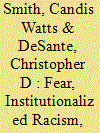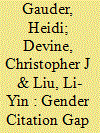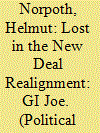|
|
|
Sort Order |
|
|
|
Items / Page
|
|
|
|
|
|
|
| Srl | Item |
| 1 |
ID:
175299


|
|
|
|
|
| Summary/Abstract |
This article responds to King and Persily’s (2019) proposal for a new model of industry–academic partnership using an independent third party to mediate between firms and academics. We believe this is a reasonable proposal for highly sensitive individual-level data, but it may not be appropriate for all types of data. We explore alternative options to their proposal, including Administrative Data Research Facilities, Data Collaboratives at GovLab, and Tech Data for Social Good Initiative at the Center for Advanced Study in the Behavioral Sciences. We believe social scientists should continue to explore, evaluate, and scale a variety of industry–academic data-sharing models.
|
|
|
|
|
|
|
|
|
|
|
|
|
|
|
|
| 2 |
ID:
175308


|
|
|
|
|
| Summary/Abstract |
The importance of slideware presentations at conferences remains underestimated. Although several articles in the profession focus on this topic, emphasis on aspects of design and aesthetics appears scant. Changing trends and advances in software, instructional design, and human–computer interactions demand political scientists adapt and pay greater attention to balance and harmony, learning to distinguish between design and decoration. Building on Salmond and Smith’s (2011) work, this article offers 10 tips for creating cleaner, more visually appealing, minimalist slideware presentations. In a world of smartphones and social media, audiences are accustomed to visual aids; therefore, clearly and succinctly conveying a presenter’s core argument and/or results is not only crucial but also paramount.
|
|
|
|
|
|
|
|
|
|
|
|
|
|
|
|
| 3 |
ID:
175302


|
|
|
|
|
| Summary/Abstract |
This article introduces, describes, and evaluates a program designed to broaden the PhD pipeline in political science to achieve greater equity and inclusion. In its fifth year, the program brings undergraduate students from two Historically Black Colleges and Universities to an R-1 political science PhD department for a seven-week summer program, in which they are paired with a faculty mentor to conduct research for, prepare, and present an original research project. Additionally, participants attend methods classes, GRE preparatory workshops, subfield presentations from graduate students and faculty in the host department, and social events. We describe key lessons drawn from our experience in piloting this program. We evaluate its success using data about the composition of the host institution’s PhD program and exit surveys conducted with all participants from 2016 to 2018.
|
|
|
|
|
|
|
|
|
|
|
|
|
|
|
|
| 4 |
ID:
175307


|
|
|
|
|
| Summary/Abstract |
In face of the ongoing discrepancy between the number of political science PhD graduates and the availability of permanent academic positions, in this article we consider attitudes of faculty members towards options to address this issue. Based on a survey of faculty members in PhD-granting political science programs at English-speaking Canadian universities, we find considerable support for both reducing the number of PhD students admitted and reforming curriculum to ensure graduates cultivate skills transferable to non-academic environments. At the same time, faculty members are inclined to believe that PhD students themselves should shoulder the greatest responsibility for career preparation.
|
|
|
|
|
|
|
|
|
|
|
|
|
|
|
|
| 5 |
ID:
175294


|
|
|
|
|
| Summary/Abstract |
For nearly 75 years, scholars of American public opinion have sought to measure whites’ attitudes toward blacks: social scientists have invented and revised ways to measure what we could refer to as “racial prejudice.” With each revision, scholars who believe they have captured new forms of racial animus are met with opposition from those who believe that old-fashioned anti-black affect is a thing of the past. We directly answer these claims by collecting a surfeit of attitudinal measures to simultaneously estimate the relationship between cognitive beliefs about the racial status quo and emotional reactions to racism. First, we uncover that two higher-order dimensions undergird whites’ racial attitudes. Second, we validate a four-item version of our new battery using the 2016 Cooperative Congressional Election Study.
|
|
|
|
|
|
|
|
|
|
|
|
|
|
|
|
| 6 |
ID:
175303


|
|
|
|
|
| Summary/Abstract |
Previous studies documented a “gender citation gap” in political science whereby women are less likely to be cited in published research and course syllabi, especially by male scholars. However, no previous study examined citation patterns among students in political science courses to determine if similar patterns are evident in their research. This article analyzes an original database of individual as well as group research assignments from an undergraduate research methods course. Our analysis indicates that male students are significantly less likely than female students to cite research published by women—whether as first authors, any of the authors, or the average percentage of authors per team. However, in a subsequent group research assignment, gender diversity had no discernible effect on group citation patterns. We discuss the implications of these findings for current pedagogical practices and the future state of the discipline.
|
|
|
|
|
|
|
|
|
|
|
|
|
|
|
|
| 7 |
ID:
175306


|
|
|
|
|
| Summary/Abstract |
Claims of misconduct must be accompanied by verifiable proof. In “Diagnosis versus Ideological Diversity,” Phillip W. Gray (2019) professes the need to address bias and dishonesty in research but contradicts his stated goals by making untrue and unsupported allegations of misconduct. He equates a coding error with LaCour and Green’s (2014) suspected data fabrication while disregarding publicly available contradictory evidence. In this evidence-based article, we demonstrate that Gray made a series of false accusations of research dishonesty and ideological bias. His assertions not only are unsupported; the evidence also shows the opposite. PS: Political Science & Politics edited Gray’s article after publication and online distribution—removing or modifying the most explicitly false and harmful statements—and changed his central thesis but without changing the DOI. This resulted in two different articles with the same DOI. Although retraction is uncommon, this degree of post-publication modification appears to meet the threshold. The published corrigendum failed to address Gray’s false allegations, pervasive and unsubstantiated insinuations of misconduct, and errors that persist in the second edition of his article. The constellation of behaviors by the journal and Gray contradicts academic norms and emphasizes the need to establish clear standards of evidence when making accusations of academic misconduct.
|
|
|
|
|
|
|
|
|
|
|
|
|
|
|
|
| 8 |
ID:
175301


|
|
|
|
|
| Summary/Abstract |
Women earn approximately half of all bachelor’s degrees in political science but they comprise only 22% of full professors. Scholars have offered various likely explanations and proposed many interventions to improve women’s advancement. This article reviews existing research regarding the effectiveness of these interventions. We find that many of the proposed interventions have yet to be fully evaluated. Furthermore, some of the policies that have been evaluated turn out to be ineffective. Women’s mentoring and networking workshops are the most promising of the fully tested interventions. The potential for failure underscores the need for additional evaluation of any proposed intervention before widespread implementation.
|
|
|
|
|
|
|
|
|
|
|
|
|
|
|
|
| 9 |
ID:
175304


|
|
|
|
|
| Summary/Abstract |
The Introduction to American Government course, and its textbook, is a nearly universal experience for students in American colleges and universities, but what exactly is being taught in this course? Do the textbooks used in this widely taught course accurately reflect the diversity of populations and experiences in the United States? More specifically, how do textbooks for Introduction to American Government cover historically marginalized groups, if at all? This article builds on previous work by analyzing the representation of individual historically marginalized groups to conduct index search and content analyses on traditionally published and openly licensed (i.e., open educational resources [OER]) textbooks. This study finds that American government textbooks include little coverage of any historically marginalized groups, and that OER textbooks are average in this respect, doing neither better nor worse than their traditionally published counterparts.
|
|
|
|
|
|
|
|
|
|
|
|
|
|
|
|
| 10 |
ID:
175295


|
|
|
|
|
| Summary/Abstract |
Military service in World War II produced a generation of Democrats. This finding results from an examination of Gallup polls (1945–1953) that probed both party identification and wartime service. The 1944 election afforded soldiers an opportunity to vote for their commander in chief, and they did so by a large margin for Franklin D. Roosevelt—a Democrat. A vote under these circumstances is bound to leave lifelong marks on a cohort in its impressionable years, which was the life stage of many World War II soldiers. Further tests rule out the possibility that the Democratic tendency of soldiers was simply the result of their youthful age, lower socioeconomic status, urban background, union membership, race, or Southern region—all of which predict partisanship. Neither did the return to civilian life erode the Democratic edge of veterans. GI Joe is an unsung hero of what is widely known as the New Deal realignment.
|
|
|
|
|
|
|
|
|
|
|
|
|
|
|
|
| 11 |
ID:
175298


|
|
|
|
|
| Summary/Abstract |
The mission of the social sciences is to understand and ameliorate society’s greatest challenges. The data held by private companies, collected for different purposes, hold vast potential to further this mission. Yet, because of consumer privacy, trade secrets, proprietary content, and political sensitivities, these datasets are often inaccessible to scholars. We propose a novel organizational model to address these problems. We also report on the first partnership under this model, to study the incendiary issues surrounding the impact of social media on elections and democracy: Facebook provides (privacy-preserving) data access; eight ideologically and substantively diverse charitable foundations provide initial funding; an organization of academics we created, Social Science One, leads the project; and the Institute for Quantitative Social Science at Harvard and the Social Science Research Council provide logistical help.
|
|
|
|
|
|
|
|
|
|
|
|
|
|
|
|
| 12 |
ID:
175309


|
|
|
|
|
| Summary/Abstract |
This article describes a variant of experiential course design—open inquiry—that has learning-how-to-learn (or metacognition about learning) as a primary course goal. In open-inquiry designs, students first choose the problems that they will study during the course. They then co-create each class period as the semester progresses. They recognize deficiencies in their own content knowledge, skills, and learning processes and take actions to remedy them. By reflecting on their successes and failures, students practice the skill of self-directed learning. This process of metacognitive reflection is a crucial skill that they will need when they face novel problems after graduation. In open-inquiry courses, students have produced high-quality work by learning about substantive policy areas that they choose to study, developing the policy skills that they deem important, and growing in their understanding about how they learn effectively.
|
|
|
|
|
|
|
|
|
|
|
|
|
|
|
|
| 13 |
ID:
175305


|
|
|
|
|
| Summary/Abstract |
Noting the lack of “anti-man” bias research in the 2016 election, Zigerell (2019) argued that a relative lack of conservatives in political science can lead to bias in publications against political science research supporting conservative viewpoints. This article offers an alternative explanation for this lack of research: that this research produces null findings and therefore is subject to the “file-drawer problem,” in which null effects are less likely to be published than positive effects. Using data from the 2016 American National Election Studies, I provide an illustrative example to support this claim and suggest some solutions.
|
|
|
|
|
|
|
|
|
|
|
|
|
|
|
|
| 14 |
ID:
175310


|
|
|
|
|
| Summary/Abstract |
The importance of replication has been a major matter of discussion among political scientists for decades. However, in the past five years, the issue has gained greater traction, with many major journals adopting official standards for Data Access and Research Transparency (DA-RT). At the same time, scholars suggest the pivotal role that replication might play in methods training for students. Unfortunately, these conversations have been limited in that they emphasize quantitative methods and training of graduate students. This article seeks to fill this gap by offering commentary on the author’s experience in introducing a qualitative replication project in an upper-division undergraduate course. The students in the course replicated Ross’s (2004) influential article on the “resource curse,” but the assignment framework can be adopted for various topics and contexts.
|
|
|
|
|
|
|
|
|
|
|
|
|
|
|
|
| 15 |
ID:
175296


|
|
|
|
|
| Summary/Abstract |
This article considers whether candidates strategically use emotional rhetoric in social media messages similar to the way that fear appeals are used strategically in televised campaign advertisements. We use a dataset of tweets issued by the campaign accounts of candidates for the US House of Representatives during the last two months of the 2018 midterm elections to determine whether candidate vulnerability predicts the presence of certain emotions in social media messages. Contrary to theoretical expectations, we find that vulnerability does not appear to inspire candidates to use more anxious language in their tweets. However, we do find evidence of a surprising relationship between sad rhetoric and vulnerability and that campaign context influences the use of other forms of negative rhetoric in tweets.
|
|
|
|
|
|
|
|
|
|
|
|
|
|
|
|
| 16 |
ID:
175297


|
|
|
|
|
| Summary/Abstract |
In considering the liberalizing effect of college on students’ political values, we argue that political identities—in the form of self-identified ideology or partisanship—are components of social identity and are resistant to change. Using data from the Higher Education Research Institute’s student surveys, we show that what movement in identity does occur is mostly a regression to the mean effect. On several issue positions, however, students move in a more uniform leftward direction. We find that liberal drift on issues is most common among students majoring in the arts and humanities. Self-reported ideology does drift left at liberal arts colleges, but this is explained by a peer effect: students at liberal arts colleges drift more to the left because they have more liberal peers. The results have implications for future research on college student political development, suggesting that attitudinal change can be more easily identified by examining shifts in policy preferences rather than changes in political identity.
|
|
|
|
|
|
|
|
|
|
|
|
|
|
|
|
| 17 |
ID:
175300


|
|
|
|
|
| Summary/Abstract |
Researchers often want to increase the broader societal impact of their work. One way to do that is to discuss research findings directly with practitioners. Yet, such interactions are voluntary and do not regularly arise, which raises a key demand question: Under what conditions do practitioners want to connect with researchers? This article shows that relational considerations affect these decisions—that is, what practitioners expect the interaction will be like. I partnered with a US-based civic association to conduct a field experiment. I find that group leaders in this association are more likely to speak with researchers after learning that the researchers will (1) efficiently share information during the interaction, and (2) value practitioners’ knowledge. The results provide actionable guidance for how researchers should approach practitioners and also demonstrate one powerful way that social science evidence can inform efforts to bridge research and practice.
|
|
|
|
|
|
|
|
|
|
|
|
|
|
|
|
|
|
|
|
|